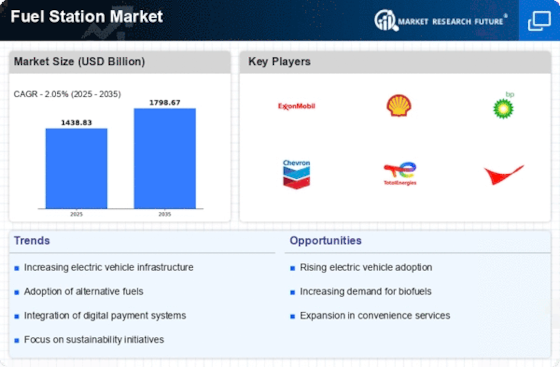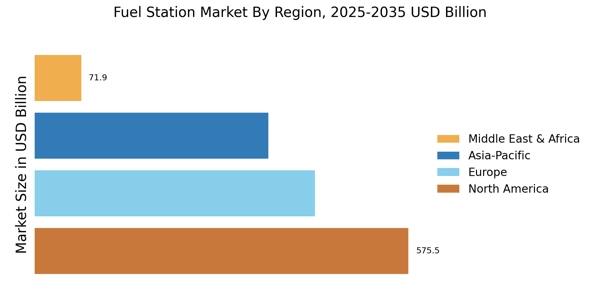Increasing Vehicle Ownership
The rise in vehicle ownership is a pivotal driver for the Fuel Station Market. As more individuals acquire personal vehicles, the demand for fuel stations intensifies. Recent data indicates that vehicle ownership rates have surged, particularly in developing regions, where urbanization and economic growth contribute to this trend. This increase in vehicle numbers directly correlates with higher fuel consumption, thereby necessitating the expansion of fuel station networks. Furthermore, the growing preference for personal transportation over public transit, driven by convenience and flexibility, further amplifies the need for accessible fuel stations. Consequently, fuel stations are likely to experience increased foot traffic, leading to enhanced sales and profitability. The Fuel Station Market must adapt to this growing demand by strategically positioning new stations and optimizing existing ones to cater to the expanding customer base.
Urbanization and Population Growth
Urbanization and population growth are significant factors propelling the Fuel Station Market. As urban areas expand, the demand for fuel stations in densely populated regions increases. The influx of people into cities often leads to higher vehicle usage, thereby escalating fuel consumption. Recent statistics reveal that urban populations are projected to rise substantially in the coming years, necessitating the establishment of additional fuel stations to meet this demand. Furthermore, urbanization often correlates with increased economic activity, further driving the need for reliable fuel supply. Fuel stations located strategically in urban centers are likely to benefit from heightened visibility and accessibility, ultimately enhancing their market share. The Fuel Station Market must strategically plan for this urban growth to ensure adequate fuel supply and service availability.
Rising Demand for Convenience Retailing
The growing trend of convenience retailing is reshaping the Fuel Station Market. Consumers increasingly seek one-stop shopping experiences, prompting fuel stations to diversify their offerings beyond fuel. Many stations are now incorporating convenience stores, food services, and other retail options to attract customers. Data indicates that fuel stations with integrated retail services experience higher foot traffic and increased sales. This trend is particularly pronounced in urban areas, where consumers value convenience and time savings. As the market evolves, fuel stations that successfully blend fuel services with retail offerings are likely to enhance customer loyalty and drive revenue growth. The Fuel Station Market must continue to innovate and adapt to these changing consumer preferences to remain competitive.
Technological Advancements in Fuel Dispensing
Technological innovations in fuel dispensing systems are transforming the Fuel Station Market. The introduction of advanced fuel pumps, automated payment systems, and mobile applications enhances operational efficiency and customer convenience. For instance, the integration of contactless payment options has become increasingly popular, streamlining transactions and reducing wait times. Moreover, advancements in fuel quality monitoring and management systems ensure that customers receive optimal fuel quality, thereby fostering trust and loyalty. Data suggests that stations adopting these technologies may see a significant increase in customer satisfaction and retention rates. As the industry evolves, fuel stations that embrace these technological advancements are likely to gain a competitive edge, positioning themselves favorably in a rapidly changing market landscape.
Regulatory Support for Clean Energy Initiatives
Regulatory frameworks promoting clean energy initiatives are influencing the Fuel Station Market. Governments worldwide are implementing policies aimed at reducing carbon emissions and encouraging the adoption of alternative fuels. This regulatory support is driving fuel stations to diversify their offerings, incorporating biofuels, electric vehicle charging stations, and hydrogen fuel options. Data indicates that regions with robust clean energy policies are witnessing a surge in the establishment of multi-fuel stations, catering to a broader range of consumer preferences. As environmental concerns continue to gain prominence, fuel stations that align with these regulatory trends may not only enhance their market presence but also contribute positively to sustainability goals. The Fuel Station Market must remain agile, adapting to these regulatory changes to ensure compliance and capitalize on emerging opportunities.

















